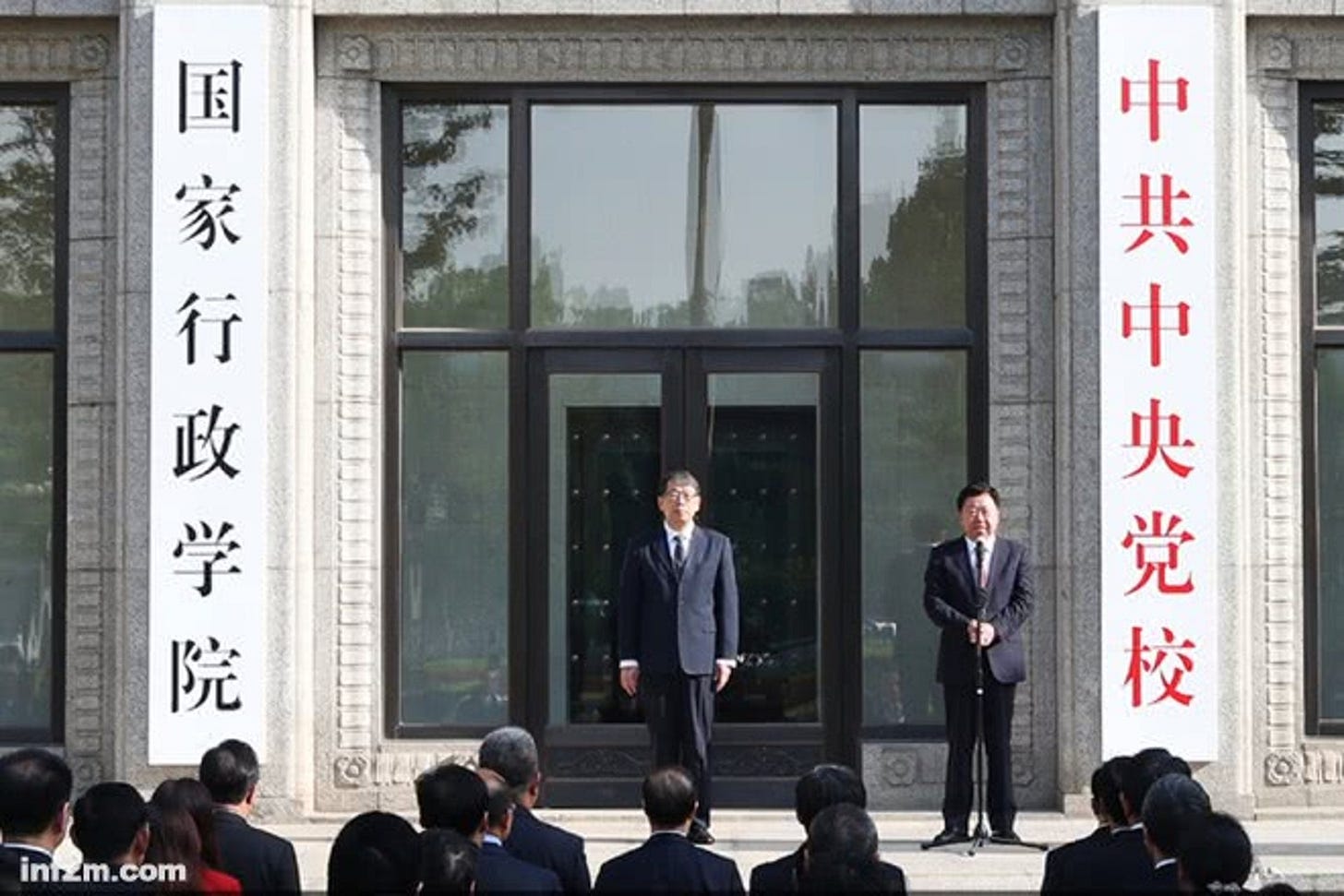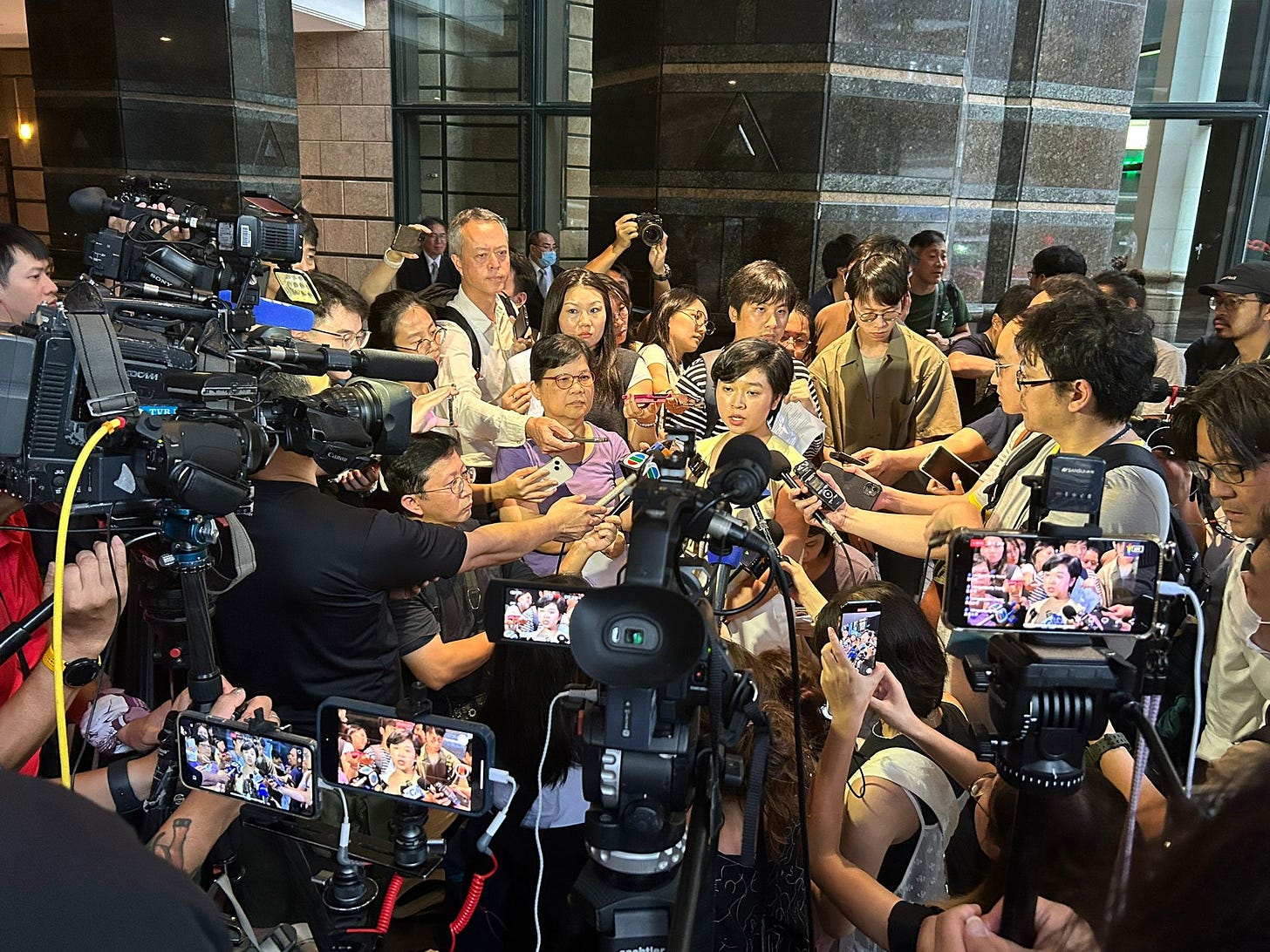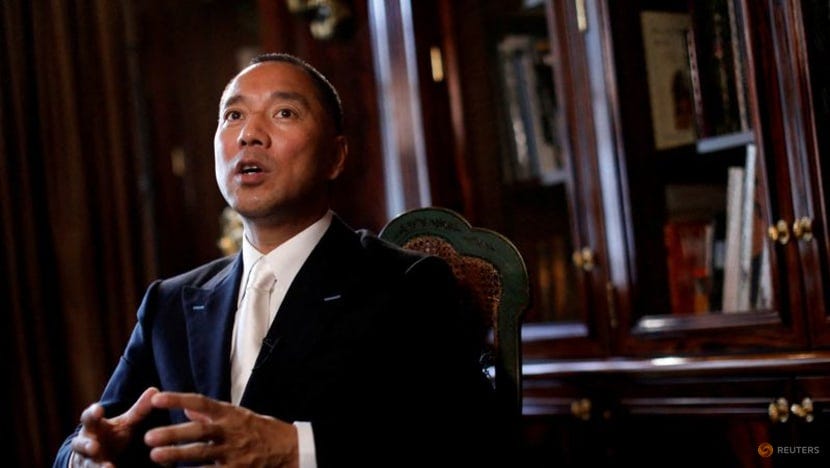Lingua Sinica Newsletter, 25 July
News, analysis, and commentary on Chinese-language media from the PRC and beyond.
Welcome back to Lingua Sinica.
And good afternoon from the fringes of Typhoon Gaemi, which is currently skirting past Taiwan and putting much of the country on lockdown.
One of the biggest storms in Hong Kong and across the region over the past week has been the Wall Street Journal’s firing of reporter Selina Cheng. Cheng was recently elected to lead the Hong Kong Journalists Association, the city’s biggest press union, and Cheng says she was dismissed as a consequence of her free press advocacy. It’s a story I covered in-depth in a post called “Code of Silence” (more on that in CMP in the Headlines below).
In Beijing, meanwhile, the Third Plenum of the CCP Central Committee got underway last week, and closed just before the weekend. Expectations were high, with international media speculating that the long-awaited plenum would see the unveiling of a new, far-reaching round of reforms to restore faith in the economy, reassure foreign investors, forge China into a tech superpower, and so much more. But despite its many, many nods to “reform” (the word appears 54 times in the communique, released in full this week), the outcome proved underwhelming to many observers. The need to build a stronger system to “improve the effectiveness of international communication” was pressed upon cadres, though — an ongoing imperative that we will continue to monitor closely.
As domestic media outlets in Taiwan reported on the big meeting across the Strait, some displayed a rather disheartening lack of media literacy and responsibility, an issue we cover in the Anti-Social section below.
We hope you enjoy these stories and more — see you all next time after Gaemi wanders off and the skies over Taipei are gloriously, scorchingly clear once again.
Ryan Ho Kilpatrick
CMP Managing Editor
CMP IN THE HEADLINES
Hong Kong’s Embattled Press Clubs
Last week, the Wall Street Journal fired reporter Selina Cheng, the newly elected head of Hong Kong’s biggest press union. This punishment, meted out by a US news organization for a staff member’s free press advocacy, has sparked a global scandal, with press groups around the world rallying around Cheng and the Hong Kong Journalists Association.
But the biggest scandal of all, as I noted in my in-depth take on the case last week, is that the Journal was far from alone. Sources I spoke to allege that numerous international news outlets in Hong Kong and China — including the BBC, CNN, and Bloomberg — have pressured their employees to stay out of press associations like the HKJA and the Foreign Correspondents’ Club, or risk losing their jobs.
CMP’s reporting on this important story, which readers can find on our website and Substack, was cited by several other outlets, including the Hong Kong Free Press, Index on Censorship, Sinocism, the University of Oxford’s Reuters Institute, and Freedom House’s China Media Bulletin.
IN THE NEWS
Persona Non Grata
This year, global media attention is likely to be locked on the threat of anti-US disinformation, streaming in from China ahead of elections on November 5. But as news from Singapore shows, the same can also happen in reverse.
Last Friday, the Singaporean government invoked a foreign interference law to block 95 social media accounts linked to Chinese billionaire-in-exile Guo Wengui (郭文貴). In the run-up to the country’s recent leadership transition, Guo’s accounts released 100 videos suggesting that the CCP was secretly running things behind the scenes. It was the first time the government used the powers granted to it by the 2021 Foreign Interference Countermeasures Act to shut down social media accounts.
Guo has a long track record of pushing anti-CCP content both online and offline— perhaps the most colorful being a series of banners flown over New York City in 2020 behind a formation of planes. The banners cryptically read: “Congratulations to the Federal State of New China,” this being the name Guo gave his campaign, as he later explained, to “overthrow the Chinese government.”
But even among those who share his general antipathy toward the CCP, Guo has been a divisive figure. A report by social-networks analysis site Graphika back in 2021 also discovered that Guo’s network had been harassing anti-CCP activists who did not back his New Federal State of China, whom he branded as “fake activists.” Last week, Guo was found guilty in a US court of defrauding his followers of one billion US dollars that he said would be invested in cryptocurrency. Instead, the court found, he had used the funds to purchase a mansion, luxury cars, and a superyacht.
QUOTE/UNQUOTE
Containing the Flood of AI Disinformation
With China ramping up its efforts to create propaganda aimed at international audiences, what are disinformation experts noticing about current tactics and actors? To find out, we spoke with Nick Monaco, a member of the Microsoft Threat Analysis Center. In April, the Center published a report on China’s use of disinformation — an issue he also posts about frequently in blog posts.
Lingua Sinica: What problems have Chinese disinformation campaigns traditionally had in achieving their goals?
Nick Monaco: Since 2019, when several large tech companies exposed Chinese influence operations (IO) on their platforms, Chinese IO actors have commonly shown a few weaknesses in their influence campaigns. One is a lack of creativity, likely stemming from a tendency of Chinese actors to stick to the strict wording of official Party doctrine, which results in covert messaging coming off as stilted and unnatural. This is even the case for Mandarin-language messaging targeting Chinese speakers residing outside of the mainland.
This in turn feeds into another historical weakness of these campaigns: the difficulty of “localizing.” It’s not easy to translate these concepts into local languages and contexts. There aren’t a lot of Chinese idioms that are easy to translate directly into non-Sinitic languages, and this is often the same with political slogans and, to some extent, even political ideologies. Chinese IO actors have tried to overcome these obstacles recently by co-opting influencers. Our team at the Microsoft Threat Analysis Center (MTAC) has tracked these operators, who speak the languages of target audiences fluently and covertly deliver messages with more skill, since early 2022.
LS: How are they trying to use AI to overcome these obstacles? Can you give any examples you’ve been seeing?
Nick Monaco: Chinese IO actors, like malicious influence actors in Russia and Iran, have increased their use of AI to augment their IO campaigns in recent years. Most notably, our recent report on emerging trends in Chinese IO exposed an uptick in AI-generated or enhanced content, including video, audio, and especially memes.
OpenAI has also provided helpful insight here. In May, they took action against IO actors using their AI models for malicious influence campaigns. Actors like Taizi Flood — our designation for the prolific PRC-linked actor known as “Spamouflage” — used the models to help debug code and stand up a website targeting dissidents.
LS: Has this technology produced any successes for them so far?
Nick Monaco: Taizi Flood produced and amplified several pieces of AI-enhanced and AI-generated content during Taiwan’s recent elections. MTAC assessed these had little impact on the ground, though, largely because they to failed to get organic traction online, were low-quality, or were mainly popularized by debunking reports from fact-checking organizations on the ground. OpenAI noted that Taizi “used our models to generate texts in languages including Chinese, English, Japanese, and Korean that were then posted across platforms including X, Medium, and Blogspot”. Taizi has continued to post its content into over 55 languages, but still consistently fails to gain engagement from real users online.
ON A LIGHTER NOTE
The Tyranny of Cuteness
Fuzai (福仔), China’s first and only corgi cop, has been something of a media sensation over the past few months, Chinese state media and diplomats alike fawning over his bright eyes and stumpy legs. Fuzai has experienced an all-out social media blitz, both domestically and internationally. He even has his own Douyin account run by his police handlers in Shandong province.
Why are Chinese official accounts pushing pooches into our timelines? This is all part of a rising trend of state media and government actors promoting “cute” content online — and there’s a strategy to this sweetness. Since Xi Jinping came to power in 2012 he has called on state media to become better at winning the hearts of the people. The Central Committee issued a set of opinions in 2020 about how to integrate multiple new developments in media, one being that Party media should “produce content the masses are more fond of” (生產群眾更喜愛的內容). In a 2021 Politburo meeting dealing with external propaganda in 2021, Xi emphasized China must cultivate a “cute” or “lovable” (可愛) image internationally.
And what’s more lovable than a little corgi in his uniform, thinking he’s a mighty German Shepherd?
The soft approach to propaganda is even being pushed by official groups with hard reputations. Through its Douyin account, the People’s Armed Police Force (人民武警), the paramilitary organization in charge of internal security, has posted clips of soldiers cooing over podgy babies, doing arts and crafts, and generally showing who they are beneath the uniform.
As social media users know only too well, adorable critters are the lowest-hanging fruit for social media engagement. But official campaigns don’t stop there. Other examples in the playbook include kitschy clips of Uygher children dancing, fresh-faced boy bands promoting Party messages, and reviving classic cartoons.
REDLINES
A Democracy Reality Check in Hong Kong
Despite the progressive unraveling of democratic freedoms and civil society in Hong Kong in recent years, government officials and PRC-backed media in the city have pressed the point that democracy is alive and well — and that the push for national security has made Hong Kong more democratic, more pluralistic, and more representative. But in an interview this week with British newspaper The Times, Hong Kong lawmaker and Executive Councilor Regina Ip (葉劉淑儀) seemed to rip the curtain away. “People don't vote for the common good,” she told the paper. “People vote for whatever serves their interests. Just following the popular will is dangerous.”
“Our experiment with democracy failed,” the lawmaker added, calling it “a political reality that you have to accept and support the CCP” and the one-party state. Pluralism and diversity, she added, were “never part of the Chinese tradition” anyway.
Ip’s was an odd argument in defense of the city’s electoral reforms, which have effectively expelled pro-democracy politicians and forced most opposition parties to disband. It was also an illuminating footnote to the Decision emerging this week from the CCP’s Third Plenum, which loudly touted the merits of Xi Jinping’s “whole process democracy” (全過程人民民主) — the idea that China’s one-party dictatorship is democratically superior to systems in the West — and spoke repeatedly of the need to improve mechanisms for “consultative democracy” (協商民主). Her combative attitude toward her democratically elected counterparts was palpable as she panned figures like Social Democrat Leung Kwok-hung (梁國雄) — currently facing life imprisonment after being convicted of conspiracy to commit subversion — as “directly-elected rabble-rousers.”

Ip’s comments made their way back into Hong Kong media in translation, through coverage by local outlets like Inmedia (獨立媒體), HK01, and the Hong Kong Economic Journal (信報財經新聞). In Taiwan, the story also caught the attention of the United Daily News (聯合報) and Photon Media (光傳媒), a newsroom-in-exile staffed by former Hong Kong journalists. The day after her interview ran in The Times, Ip fired a broadside at Britain’s parliamentary democracy on her personal website, questioning “whether MPs elected under such a distorted electoral system truly have a mandate from the people.” Similarly critical appraisals of Hong Kong’s own electoral system from British politicians have been condemned as “smears” and “malicious slander” by the SAR government.
EXPLAINER
Why are China’s leaders buzzing about media integration?
In recent years, the buzzword “media convergence,” or meiti ronghe (媒體融合), has abounded in official documents about public opinion and ideology in China. What does this term mean? And why is it important in a Chinese political context? The quick answer — it is about remaking information controls for the 21st century, and building a media system that is innovative, influential and serves the needs of the ruling party. As CMP Director David Bandurski wrote this week, it is at the heart of Xi Jinping’s decade-long effort to remake China’s media system.
The idea of “media convergence” took off in official circles in China almost exactly 10 years ago as Xi Jinping sought to remake “mainstream media” (主流媒體) — referring narrowly in China’s political context to large CCP-controlled media groups, such as central and provincial daily newspapers and broadcasters — into modern communication behemoths for rapidly changing global media landscape. More insistently even than his predecessors, Xi believed it was crucial for the Party to maintain social and political control by seizing and shaping public opinion. To accomplish this in the face of 21st century communication technologies, built on 4G and eventually 5G mobile networks, the Party’s trusted “mainstream” media had to reinvent themselves while remaining loyal servants of the CCP agenda.
Xi Jinping has seen the global phenomenon of media convergence, the integration of information and communications technologies, as a golden opportunity to consolidate the Party’s control. Will he succeed? For more on the CCP’s media convergence efforts, visit our full post on the CMP website.
ANTI-SOCIAL
Taiwan’s McNews Problem
As China’s Third Plenum grabbed headlines last week, the secretive nature of the political event invited a more than usual level of speculation. As media across the political spectrum in Taiwan grasped for alluring tidbits of information, some turned to less than reliable, and even outright disreputable, sources. One of the most unfortunate cases of garbage handling could be seen as several media reported speculation that Chinese leader Xi Jinping had suffered a stroke. The source cited for this information was “the foreign media outlet ‘General MCNews.’”
McWho?
As Business Today (今周刊), a financial magazine launched in 1996, reported, citing this odd outlet, “Xi Jinping is rumored to have suffered a stroke.” Picking up the non-story, the pan-green leaning SETN also suggested “General MCNews” was a “foreign media outlet,” though it noted that the source was a post on X. The SETN story was shared also at Line Today, the news service of the hugely popular Line messaging app. Apple Next News passed the news along with a screenshot of the original post, in which “General MCNews” credited the information to “Chinese Human Rights reporter, Jennifer Zhang.”
All of these media should have known better. But the story was too sensational to pass up. It even appeared in Chinese at Radio Free Asia (RFA).
Saluting the General of Disinformation
Who exactly is this “General MCNews”? In fact, this is not a media outlet at all, but a handle for a social media account that calls itself “The General” and has Telegram and Substack channels, as well as an account on X with more than 69,000 followers. Nowhere is “The General” forthcoming about who exactly is behind this operation. It is clear, however, that the account is a notorious source of fake news.
Back in May this year, Reuters Fact Check addressed online rumors that the World Health Organization had "abandoned its contentious Pandemic Treaty following public discourse and backlash.” According to sources at the WHO, this was a blatant misrepresentation of the simple fact that a global treaty for international pandemic preparedness was set to wrap up. As Reuters wrote: “Some Facebook posts sharing the false claim cite the X account @GeneralMCNews as a source. It did not immediately respond to a request for comment.”
And what of “Jennifer Zhang”? In all likelihood, “The General” meant to point to Jennifer Zeng, a television host and influencer based in the United States who was widely reported as the source of the stroke rumor, and who reported falsely on her “Inconvenient Truths” channel two years ago that Xi Jinping had fallen in a coup.
SPOTLIGHT
Sign of the Times
In recent years, Hong Kong authorities have been cracking down on the city’s street signs in the name of public safety. The iconic neon lights that made its streets glow and hum for generations, creating an image of Hong Kong that has lived on in the world’s imagination for decades, were an early casualty of this campaign. And lately, even unilluminated, hand-written street signs by local calligraphy masters have started coming down.
But it's not all doom and gloom. Like with so many stories about Hong Kong these days, the saga of its endangered streetscapes is as much about the resilience and creativity of its people as it is about the indifference and overreach of its government. In their visually stunning feature “Using Fonts to Hold Onto Fading Streetscape Memories,” Taiwanese digital news outlet The Reporter (報導者) introduces us to some of the things that make Hong Kong street signs so unique and distinctive, and to the movement to digitize and preserve the popular Beiwei (北魏) calligraphy and type design in particular.
The story of these typeface aficionados is a familiar one for anyone who’s been watching Hong Kong closely over the past five years or so. We’ve seen it before in local history buffs, art lovers, and linguists who have thrown themselves head-first into their pet passions — both to escape the often grim realities of contemporary Hong Kong and to do their bit to preserve the fading Hong Kong that they know and love. "Hong Kong society has changed so much in the past few years,” as one of the piece’s subjects puts it. “People are more likely to look back and try to preserve local culture through these fonts.”
Read The Reporter’s full feature here.
NEWSPEAK
Split Personalities
Ever wonder why foreign journalists know the Central Propaganda Department's External Propaganda Leading Group as the State Council Information Office, and why the Central Party School of the Chinese Communist Party introduces itself abroad as the National Academy of Governance?

These are two examples of “one institution with two names” (一個機構兩塊牌子), the PRC’s frequent practice of giving one ministry, bureau, or work unit two distinct names: one for Chinese audiences and one for foreigners, who might see said organization differently if they knew about its close affiliation with the Communist Party.
For more examples of “one institution with two names” and what this practice says about the separation of Party and state in China (or, increasingly, the lack thereof) read the latest entry in our CMP Dictionary.
GOING GLOBAL
Guiding Coverage in Guyana
China’s government has played the long game in wooing journalists from the Global South.
Highlighting the growing role of China’s provinces in the state-led push to bolster its global messaging, a media delegation from the South American country of Guyana visited a propaganda office-run international communication center (ICC) in the coastal province of Shandong this week — with at least one outlet signing an agreement for cooperation.
The Guyana media delegation included journalists from the country’s state-owned television and radio broadcaster, the National Communications Network (NCN), Stabroek News, Kaieteur News, and the Guyana Times. During their visit, the Guyanese outlets toured the facilities of the Shandong International Communication Center (山東國際傳播中心), or SICC, a center established in November last year under the state-owned Shandong Radio and Television (山東廣播電視台), tasked with boosting Chinese propaganda abroad.
In a formal ceremony on Monday, the SICC signed a cooperation agreement with the Guyana Times, with both sides pledging to “deepen cooperation in the exchange of news copy, personnel, branding, and other aspects.” The Guyana Times, which identifies itself in its motto as a “beacon of truth,” was first launched in 2008 as the country’s first full-color broadsheet, and now runs an online news portal as well as radio and television channels in the country, directed as its population of just over 800,000 as well as diaspora communities in the United States and Canada.
Read the full story and learn more about ICC development at the CMP website.













